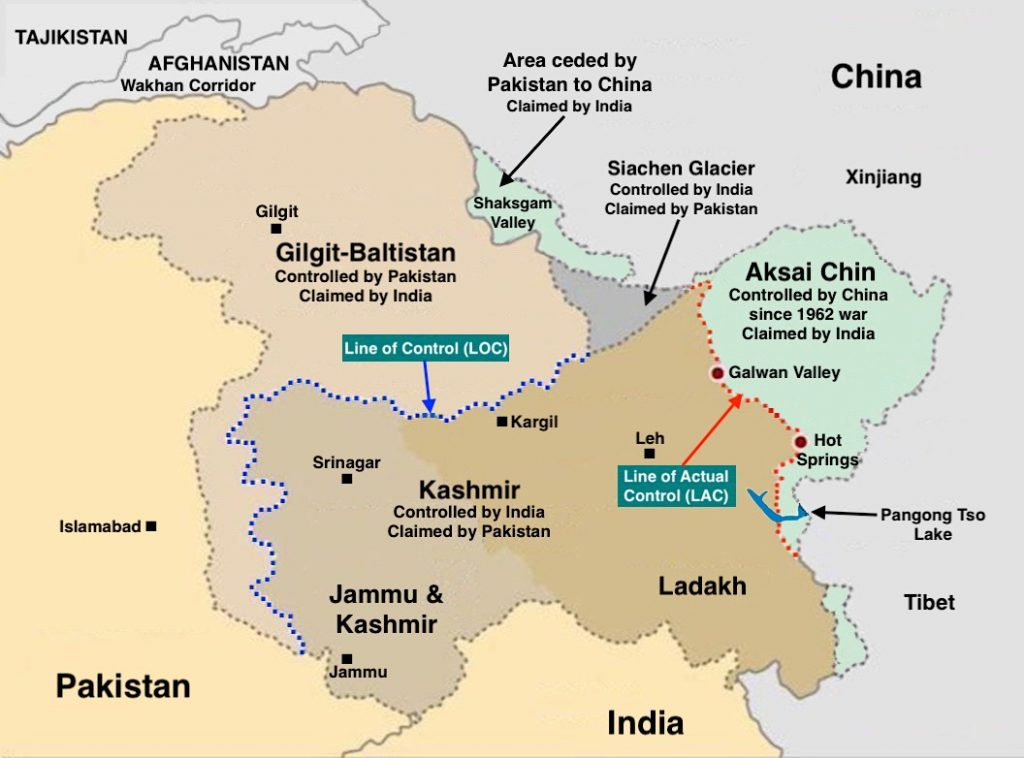Chinese Aggression, Indian Resolve
This article is based on the editorial The Chinese challenge uncovers India's fragilities which was published in The Hindu on 06/01/2022. It talks about the India - China relations and the conflict, especially the border conflict and also suggests a way forward.
For Prelims: Pangong Tso Lake and other important lakes of the region, India - China Relations, Siachen Glacier and other glaciers of the Himalayan region,
For Mains: Issues related to India - China relations and the way forward, ‘ Asian Century’, Informal Summits between India and China, Indo - Pacific
China, recently renamed 15 places in Arunachal Pradesh and justifies the renaming as being done on the basis of its historical, cultural and administrative jurisdiction over the area. Moreover, on January 1, 2022, China’s new land border law came into force, which provides the People’s Liberation Army (PLA) with full responsibility to take steps against “invasion, encroachment, infiltration, provocation” and safeguard Chinese territory. Also, China is constructing a bridge on the Pangong Tso lake which is claimed by India as its territory.
All these instances again make the already bad relationship worse.
The External Affairs Ministry said that the move by Beijing ‘does not alter’ the fact that Arunachal Pradesh — itself a Sanskritised rechristening of the North-East Frontier Agency in 1971 on being made a Union Territory – was an integral part of India.
In this context, it is imperative that India and China start an effective disengagement process and resolve the issue of border conflict in order to bring about an ‘Asian Century’.
Pangong Tso Lake
- Pangong Lake is located in the Union Territory of Ladakh.
- It is situated at a height of almost 4,350m and is the world’s highest saltwater lake.
- Extending to almost 160km, one-third of the Pangong Lake lies in India and the other two-thirds in China.
Associated Issues
- Possibility of War: A aggressive boundary dispute between India - China and collusion of China with Pakistan might lead to a full-blown war between three nuclear-armed states.
- Impacting Trade: The frequent disputes between the two countries adversely impact the economic trade and business of the two countries and this is not healthy for the two developing nations.
- Economic Constraints: Capability building also requires a serious debate, particularly in view of the fact that the country’s economic situation will not permit any significant increase in the Defence Budget for the foreseeable future
Issues Associated With Disengagement Process
- The events of last year have left enormous distrust, which remains a hurdle, and China’s actions on the ground have not always matched its commitments.
- China’s policy of territorial expansion is one India is critical of.
- Further, China is wary of India’s attractiveness to the United States and the Quadrilateral Security Dialogue.
- Owing to the disputed nature of the border and a lack of trust between the two sides, any perceived violations of ‘no patrol’ zones can lead to deadly outcomes as seen in Galwan valley in 2020.
Way Forward
- Both sides should take guidance from Wuhan and Mahabalipuram summits on developing India-China relations, that includes not allowing differences to become disputes.
- Border troops should continue their dialogue, quickly disengage, maintain proper distance and ease tensions.
- The two sides should abide by all the existing agreements and protocols on China-India boundary affairs and avoid any action that could escalate matters.
- Continuing communications through the Special Representatives mechanism, and meetings of the Working Mechanism for Consultation and Coordination on border affairs.
- The Special Representatives (SRs) on the Boundary Question was established in 2003. It provided important guidance for ensuring peace and tranquility in border areas in a challenging situation.
- Working to conclude new confidence-building measures.
|
Drishti Mains Question It is imperative that India and China start an effective disengagement process and resolve the issue of border conflict in order to bring about an ‘Asian Century’. |


